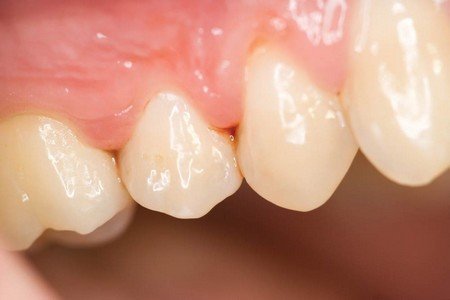Gingivitis is an inflammation of gums caused by bacteria. It is a very common and mild form of gum disease that may cause irritation, redness, and swelling of gums. The most common cause of gingivitis is poor oral hygiene that causes accumulation of plaque on the teeth, pockets between the teeth and gums. If you brush vigorously and even floss improperly, you may harm your gums. This can occasionally irritate the gums and may cause cuts and may leave open to bacteria entering the gums. The bacteria can get into the bones at the root of teeth and eat them away.

Eating a carbohydrate-rich diet promotes an acid in the mouth that encourages bacterial growth. It is very difficult to get rid of food debris, bacteria, and mucus completely. If plaque stays more than 2-3 days, it forms a hard mass commonly called tartar (calculus) which traps bacteria that cause gingivitis. Bacteria release chemicals that can eat away at the bones that hold the roots of the teeth. These chemicals may cause bad breath also. Plaque requires daily removal because it forms very quickly, usually within 24 hours. Brushing and flossing your teeth daily can remove plaque but you cannot get rid of tartar by brushing and flossing, as it requires cleaning from a dental professional.
Some people are more prone to getting gingivitis than others. There are some diseases that also make you more prone to attacks of gingivitis. Some of them are given under:
- Diabetes
- Aids
- Leukemia
- HIV
- Addison’s disease
You may also like more information about your teeth problems
1. Avoid bad habits to get beautiful teeth
2. Get beautiful and white teeth
3. Home Remedies To Whiten Your Teeth
Other contributing factors gingivitis is:
- Puberty
- Pregnancy
- Menopause
- Hormonal fluctuations
- Smoking
- Genetics
- Poor-fitting fillings and crowns( Known as caps)
- Contraceptive pills
- Pan and/ or tobacco chewing
- Allergic reaction
- Hypertension medicines
- Steroid use
- Psychotropic drug usages
- Vitamin C deficiency
- Eating too many sticky sweets
- Epilepsy medications
Bad Effects of Gingivitis
In the initial stage, gingivitis can be very mild and you may not be aware of this condition. If you ever have some blood on your toothbrush or you spit out blood, you may suffer from gingivitis. In the early stage, gingivitis can be treated, if it remains untreated, it can lead to an advanced periodontal disease known as periodontitis. At this stage, it may be painful to touch gums and gums may be swollen and look shiny because of the formation of pus internally. It is a leading cause of tooth loss in general and the number one cause in senior citizens.
Treating and Preventing Gingivitis
Proper care at home plays a key role in preventing and treating gingivitis. There are some of the steps you can take home:
1. The best way to prevent gingivitis is to take good dental care. Brush your teeth twice daily with a soft toothbrush in the morning and at the time of going to bed.
2. Brush your teeth in a proper way. Do not brush your teeth horizontally. You may learn the brushing technique with your dentist.
3. Avoid too frequent brushing and too hard scrubbing.
4. Replace the brush every month and never share your brush with anyone.
5. Flossing daily. Brushing twice a day and flossing reduces the bleeding from gingivitis.
6. Toothpaste that contains fluoride should be used to deter the decay of teeth and promote remineralization of the teeth enamel.
7. Toothpaste that contains peroxide and tooth whitening component should be avoided by the patients who are suffering from gingivitis.
8. Get your teeth checked regularly with your dentist and use antiseptic mouth wash if recommended by your dentist.
9. Avoid refined sugar between meals.
10. Avoid refined carbohydrates containing foods that lead to acid build-up and promote bacterial growth, the main cause of gingivitis.






